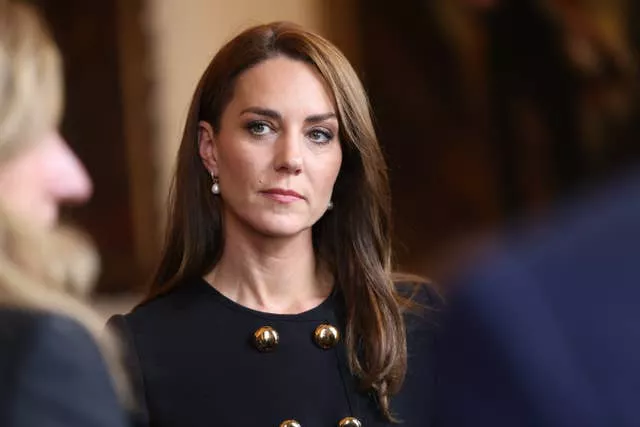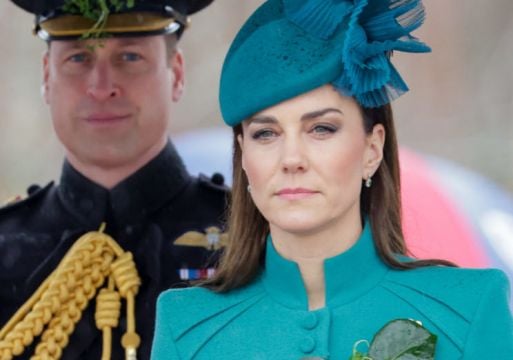The hospital at the centre of claims staff attempted to access private medical records of Britain's Princess of Wales has vowed “all appropriate investigatory, regulatory and disciplinary steps will be taken”.
Chief executive of the London Clinic, Al Russell, said: “There is no place at our hospital for those who intentionally breach the trust of any of our patients or colleagues.”
The UK’s privacy watchdog, the Information Commissioner’s Office (ICO), is looking into the alleged royal data breach at the private hospital where Kate had abdominal surgery and is in the process of assessing the information.
According to The Mirror, an investigation was launched at the clinic, where Kate spent 13 nights in January, after at least one member of staff tried to access Kate’s notes while she was a patient there.
The allegations are the latest blow to hit the Britain's future queen, whose absence from public life over the past two months has led to wild conspiracy theories on social media about her whereabouts and health.
The digitally-altered Mother’s Day photograph of Kate and her children, which Kate admitted to editing, further compounded the problem.
Mr Russell, said in a statement: “Everyone at the London Clinic is acutely aware of our individual, professional, ethical and legal duties with regards to patient confidentiality.

“We take enormous pride in the outstanding care and discretion we aim to deliver for all our patients that put their trust in us every day.
“We have systems in place to monitor management of patient information and, in the case of any breach, all appropriate investigatory, regulatory and disciplinary steps will be taken.
“There is no place at our hospital for those who intentionally breach the trust of any of our patients or colleagues.”
Ingrid Seward, editor-in-chief of Majesty magazine, said the online rumours and frenzy around Kate was “spiralling out of control”.

She said she had a “chilling feeling” that it reminded her of the time just before Diana, Princess of Wales’s death.
Ms Seward told Times Radio: “For me, it sort of has a very chilling feeling.
“It reminds me that just before the Princess of Wales was, the other, you know, Diana, Princess of Wales, was tragically killed in that car accident, it was spiralling out of control then.
“I remember every single day it was headline news – what she was doing on her holiday in France with Dodi Fayed.
“I just remember saying, this is spiralling out of control. And I’ve got the same feeling now.”

She stressed that the royal family was entitled to privacy.
“They’ve got to have some privacy in order to survive, in order to exist and do what they do. They can’t have everything out there,” she said.
But Ms Seward warned that the Windsors needed a new strategy, and suggested the late queen’s advice to ignore rumours belonged to a different era.
“I think it is a world that’s gone. As much as it did used to work. ‘Never complain, never explain’ did work, but it doesn’t work now, not in the age of social media,” she said.

Downing Street meanwhile urged people to “get behind the Princess of Wales”.
Asked about the alleged breaches at the London Clinic following Kate’s treatment, the British prime minister’s official spokesman said: “Clearly there are strict rules on patient data that must be followed.”
Asked whether people should give Kate a break, the spokesman said: “I think we all want to get behind the Princess of Wales, and indeed the Prince of Wales, and we obviously wish her the speediest of recoveries.”
Kate was admitted to the private hospital for abdominal surgery on January 16th.
Details of Kate’s condition have not been disclosed but Kensington Palace previously said it was not cancer-related and that the princess wished for her personal medical information to remain private.

Under the Data Protection Act 2018, it is an offence for a person to obtain, disclose or retain personal data without the consent of the data controller.
The ICO can carry out criminal investigations and prosecute individuals where it believes an offence may have been committed.
Usually, an assessment of the breach report will be carried out by its Criminal Investigation Team, who will decide whether to proceed in accordance with the Regulatory Action Policy.
This decision includes looking at whether there is sufficient evidence to support a prosecution and whether it is in the public interest to do so.

Kate also has the option of bringing a private prosecution with a civil action, and also potentially claiming compensation.
The police also have powers to investigate, and they do bring prosecutions under the Data Protection Act, normally when other offences are prosecuted at the same time.
UK health minister Maria Caulfield said police have “been asked to look at” whether staff at the clinic attempted to access the princess’s medical records.
She said there could be “hefty implications” for accessing the notes without permission, including prosecution or fines.

Ms Caulfield said her understanding was that police had been contacted, although a Metropolitan Police spokesman said he was not aware of any referral to the force.
A spokesperson for the ICO said: “We can confirm that we have received a breach report and are assessing the information provided.”
Kensington Palace said: “This is a matter for The London Clinic.”
Footage emerged of the princess out shopping with the Prince of Wales at the weekend at the Windsor Farm Shop close to their Adelaide Cottage home.

The British royal couple also spent Sunday morning watching Prince George, Princess Charlotte and Prince Louis taking part in a sporting event, according to The Sun.
It was reported at the weekend that Kate may speak about her health during public engagements which are not expected to resume until after Easter.
Meanwhile, health regulators stressed the importance of the confidentiality of patient information.
A spokesperson for the General Medical Council, which regulates doctors, said: “We will take appropriate action where those concerns pose a risk to patients or public confidence in the profession.”
A Health and Care Professions Council spokesperson, which regulates health workers from 15 different professions including radiographers, physiotherapists and paramedics, said: “We cannot confirm whether or not a registrant is being investigated or a complaint has been made.
“The HCPC has a duty of confidentiality to both complainants and our registrants.”
Lesley Maslen, executive director of professional regulation at the Nursing and Midwifery Council (NMC), said: “Our code is clear that all nurses, midwives and nursing associates must respect people’s right to privacy and confidentiality.”







